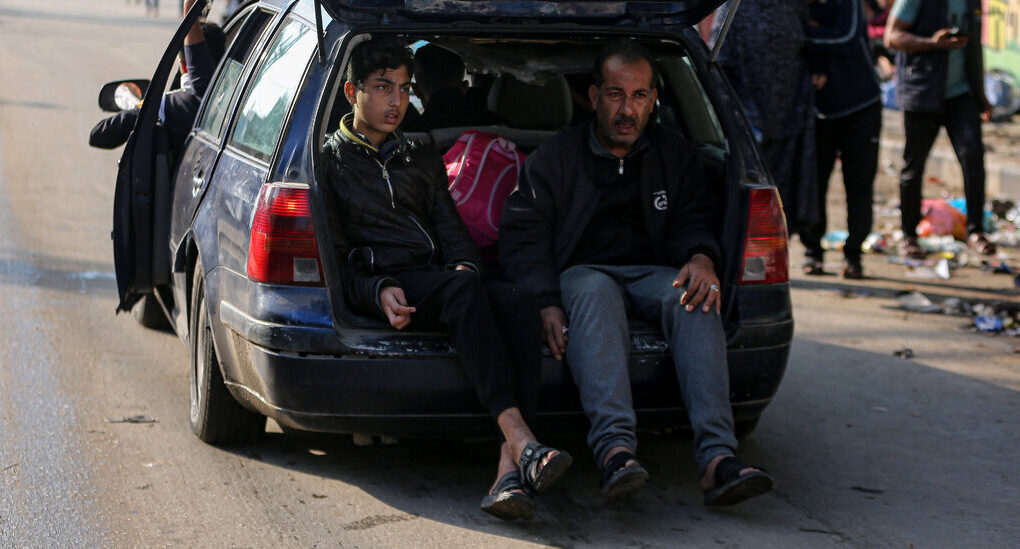The Israeli military heavily bombarded southern Gaza on Saturday and ordered residents of several Palestinian border towns in the area to leave their homes, appearing to set the stage for a ground invasion in the south as hostilities resumed after the collapse of a weeklong truce with Hamas.
The intensity of the renewed bombing — the Israeli military said it had carried out airstrikes against more than 400 targets across the Gaza Strip since fighting resumed on Friday — left many Gazans with a feeling of helplessness.
“I don’t know where to go,” said Sameer al-Jarrah, 67, who lives in Al Qarara, a town that the Israeli military ordered evacuated and that the Gazan Interior Ministry said had been hit in an Israeli strike.
Israel’s latest evacuation orders in southern Gaza could force residents in a large swath of territory along the Israeli border to flee. The Israeli demands evoked similar orders the military gave before invading northern Gaza in late October, when it urged Gazans to seek safety in the southern parts of the territory.
The Israeli military said in a statement that it had struck more than 50 locations in and around Khan Younis, the largest city in southern Gaza, where hundreds of thousands of displaced people have been sheltering after being told to leave the north.
On Saturday afternoon, the Gazan Health Ministry said 193 people had been killed in the “past hours.” It said Israeli strikes on Gaza had killed more than 15,000 people since Oct. 7, when Israeli forces began retaliating for Hamas-led attacks in Israel that the Israeli authorities say killed about 1,200 people.
Among those killed on Saturday was Sofyan Taya, a leading researcher in physics and applied mathematics at the Islamic University of Gaza. The Palestinian Ministry of Higher Education said he and his family died in an Israeli airstrike in Jabaliya, just north of Gaza City.
Mr. Taya, who was also the president of the university, was listed on Stanford University’s compilation of the top 2 percent of cited scientists around the world in 2021 and 2022. An Israeli military spokesman declined to comment on the news of his death.
As a measure of the difficulty some Gazans are facing in moving around the territory, the United Nations agency for Palestinian refugees estimated on Saturday that 50,000 pregnant women were in Gaza and that 180 were giving birth daily.
Hopes for a renewed pause in the fighting appeared to dim on Saturday, when Israel said it was withdrawing its negotiating team from Qatar, where talks on the cease-fire had been taking place. The Israeli prime minister’s office said it was leaving the talks because Hamas “did not fulfill its part of the agreement, which included the release of all children and women according to a list that was passed to Hamas and which it approved.”
Zaher Jabareen, a Hamas official who oversees prisoner issues, said in an interview on Friday that Israel had rejected multiple proposals from Hamas, all involving the return of small numbers of Israelis in exchange for at least dozens of Palestinian prisoners.
In recent days, Israel has been under pressure by the Biden administration to carry out a more surgical bombing campaign, limiting the number of civilian deaths and wholesale destruction of the northern campaign’s first weeks.
On Saturday both Vice President Kamala Harris and Defense Secretary Lloyd J. Austin III issued strong warnings to Israel to protect civilians.
Mr. Austin, a veteran of the Iraq war, said his experience in urban warfare had made him understand the difficulty of securing victories in such fighting.
“The lesson is that you can only win in urban warfare by protecting civilians,” Mr. Austin said at a meeting of defense experts in California. “And if you drive them into the arms of the enemy, you replace a tactical victory with a strategic defeat.”
Ms. Harris, speaking during a visit to the United Nations’ global climate summit in Dubai, said, “Israel must do more to protect innocent life.”
Ms. Harris’s office released a statement after she had met with President Abdel Fattah el-Sisi of Egypt in Dubai saying that the United States opposed the “redrawing of the borders of Gaza.” Israeli officials have floated the idea of creating a buffer zone between Israel and Gaza. It is not clear whether this would be considered a redrawing of the boundary.
On Saturday, initial reports from Gaza spoke of relentless bombardment. The head of the International Red Cross, Robert Mardini, described the renewed fighting as “intense.”
“It’s a new layer of destruction coming on top of massive, unparalleled destruction of critical infrastructure, of civilian houses and neighborhoods,” Mr. Mardini told the Reuters news agency.
Israel says it is targeting Hamas, which operates in and under residential areas, meaning civilians are at risk even if they are not the intended targets. But Gazans and many countries have criticized Israel for what they consider indiscriminate bombing that has disproportionately killed and maimed civilians.
A senior Israeli official, who spoke on condition of anonymity to discuss wartime strategy, signaled that the next phase of the war would not be open-ended. Israeli forces, he said, expected to be “in a high-intensity operation in the coming weeks, then probably moving to a low-intensity mode.”
A senior U.S. official said on Saturday that the Biden administration had seen the Israeli plans for the next phase and officials were satisfied that the plans reflected the U.S. pressure for Israel to be more cautious about civilian fatalities.
Still, some outside analysts said it was premature to conclude that the Israeli assaults in Gaza would be any less deadly for noncombatants. “It’s too soon to say whether any guidance or requests that the Biden administration has made of Israel have made a significant difference,” said Brian Finucane, a former legal adviser at the State Department who is now senior adviser for the U.S. Program at the International Crisis Group, an independent organization focused on conflict prevention.
During the first seven weeks of fighting, the Israeli military focused its ground troops in the north. On Saturday, the military hinted that its troops had begun to operate in southern Gaza overnight. In a statement, the military said that naval troops had “carried out a targeted operational activity in the Khan Younis marina and Deir al-Balah,” two coastal sites south of the area that Israel had already captured from Hamas.
A military spokesman, Lt. Col. Peter Lerner, said the troops had not set foot on the shore.
Israel believes that Hamas’s top leadership is hiding in southern Gaza. It is also where most of the remaining hostages taken from Israel on Oct. 7 are being held, according to a senior Israeli defense official. The Israeli military said Chief of Staff Lt. Gen. Herzi Halevi and Ronen Bar, the head of the Shin Bet, the internal security service, met on Saturday and approved battle plans for a further ground offensive in Gaza, without specifying where.
The Israeli military signaled that more operations were imminent in both northern and southern Gaza. In addition to its warnings to residents of Al Qarara and other villages next to the border with Israel, it ordered some residents in and around Gaza City, in northern Gaza, to head west.
Some Palestinians near Khan Younis said on Friday that Israeli military aircraft had dropped leaflets directing people to evacuate to shelters in the area of Rafah, a city along Gaza’s border with Egypt. The leaflets, which had the insignia of the Israel Defense Forces, declared Khan Younis “a dangerous combat zone.”
Israeli ground forces have already captured parts of northern Gaza, and Israeli officials have said for weeks that their infantry aims to advance across all of the north and to head south toward Khan Younis.
The southern villages that were ordered to evacuate on Saturday lie between the Israeli border and Khan Younis, suggesting that Israeli forces may be preparing to advance through them during an invasion of the south. They include Al Qarara, Bani Suheila, Abasan and Khuza’a.
About 1.8 million Gazans — 80 percent of the territory’s population — have already been displaced by the war, according to the United Nations.
The resumption of fighting has curtailed the deliveries of food, medicine and other vital supplies needed in the territory. The United Nations said that no aid convoys had entered from Egypt on Friday, and humanitarian operations in Gaza had largely stopped amid the renewed bombardment. The Palestine Red Crescent Society said on Saturday that it had received 50 aid trucks from Egypt.
Patrick Kingsley reported from Jerusalem, Rawan Sheikh Ahmad from Haifa, Israel, and Thomas Fuller from San Francisco. Reporting was contributed by Aaron Boxerman, Iyad Abuheweila, Peter Baker, Michael D. Shear, Ben Hubbard, Karen Zraick, Ameera Harouda, Julian E. Barnes and Gaya Gupta.



